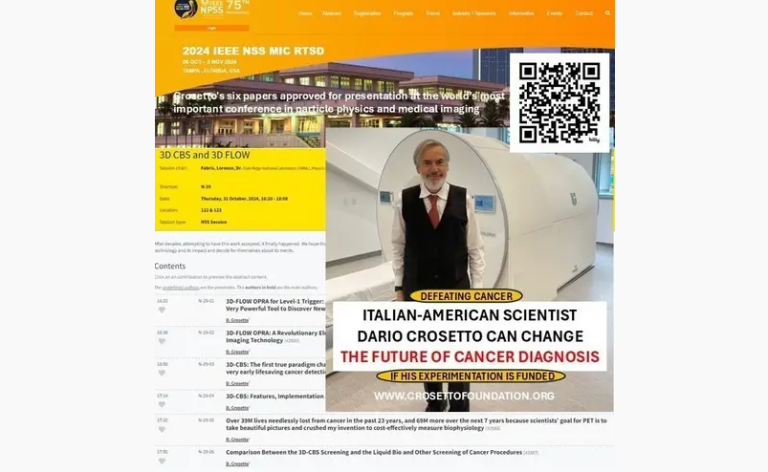Italian-American scientist Dario Crosetto is set to present his groundbreaking cancer detection technology at the IEEE Nuclear Science Symposium and Medical Imaging Conference (NSS-MIC-RTSD) in Tampa, Florida. The conference, considered one of the most prestigious events in particle physics and medical imaging, will host around 2,000 scientists from across the globe.
Crosetto, whose work focuses on particle detection and early cancer diagnosis, expressed his appreciation to the event organisers for supporting what he describes as “Transparency in Science.” His six research papers, approved by the conference reviewers, are scheduled for presentation on October 31, 2024, with Crosetto allocated nearly two hours to outline his inventions.
Central to his presentation will be his 3D-Flow and 3D-CBS technologies, which Crosetto claims offer superior flexibility, performance, and cost-effectiveness compared to existing methods in both particle detection and cancer diagnosis. His technology, he says, could revolutionise early cancer detection, identifying tumours at a stage when they consist of only 100 cells, far earlier than traditional CT scans or MRIs, which typically require 1 million cells for detection.
At the heart of Crosetto’s appeal is his challenge to the scientific community to demonstrate comparable innovations. He insists no other current or past project matches the flexibility, cost-efficiency, or performance of his 3D-Flow and 3D-CBS systems in detecting particles or diagnosing cancer. “I invite my colleagues to provide evidence of any system that can rival my inventions,” Crosetto said, highlighting the potential of his work to reduce cancer deaths and healthcare costs.
Crosetto’s innovations, he argues, have the capacity to save millions of lives and billions of dollars in healthcare. Yet, despite the apparent life-saving potential of his work, he maintains that it has been overlooked by large research institutions and funding bodies. His unrefuted calculations claim that, had his technology been widely implemented, millions of lives could have been saved over the past two decades.
The scientist is calling on leading scientific bodies, including CERN and the Pontifical Academy of Sciences, to attend his presentations. Crosetto’s direct appeal to these institutions, some of which have members who are Nobel laureates, is a challenge to take responsibility for reviewing his work thoroughly. He urges them to compare his claims with other technologies in the field.
In addition to scientists, Crosetto is calling for support from wealthy philanthropists, including those involved in the Giving Pledge initiative, as well as government agencies. He believes a fraction of the over $30 trillion spent on research and development in recent decades could fund the creation of two 3D-CBS devices, allowing experimental results to conclusively prove the effectiveness of his approach.
As Crosetto prepares to present his innovations, he is optimistic that his work will gain the recognition he believes it deserves and open up new possibilities for cancer detection and particle research worldwide.



